- Home
- Gaelen Foley
Lord of Fire Page 13
Lord of Fire Read online
Page 13
The peasants claimed that phantoms walked on nights like this, Lucien thought, his mood as sulky and dark as the sky, where no moon shone. Woolly clouds trampled the crisp elegance of the constellations as the wind herded them on like vast gray sheep. The chill of the night and the speed of his stallion’s gallop helped to take the edge off the hurt and anger he was still nursing, thwarted passion burning in his veins. Alice’s words had cut him, but even so, he had waited like a fool for her to come out of her room, busying himself for hours with minutiae, unable to concentrate until the maid told him that Miss had asked for supper in her room.
He had realized that she was battening down in there for a siege. He had spent enough time in the army to hate sieges with every fiber of his being. They always ended disastrously. He didn’t suppose he could starve her out, but he refused to try to wheedle her out again with words. He still had the key, of course, and could win the battle in a trice, but that was hardly an honorable victory. If he simply barged in on her, she would only detest him more. He was beginning to see that he could not win by any of his usual methods. What the devil had he gotten himself into? He slowed his horse, sensing that the stallion’s initial explosive burst of verve upon being let out of its kingly stall had been spent.
Predictably, the stallion settled into a more amenable temper. Lucien gave the horse’s velvety neck a grateful pat; he understood the animal’s eccentricities, and the horse understood his. Leaving the woods for the open moors, they dropped back into a leisurely canter.
After half an hour’s ride, his destination came into sight perched atop the next rise—a lonely coaching inn called the George’s Head. It was an assuming rectangle of stone with a slate roof and neat, narrow windows with white-painted frames. The George’s Head served one of the best draught bitters in the county, but its obscure location and the reliable discretion of its innkeeper, Gus Morgan, was what had made Lucien select it as his intelligence postbox for his secret communiqués from Lord Castlereagh and messages from his far-flung contacts. His body tensed and his vigilance heightened as he neared the tavern, his sharply honed reflexes ready to reach for the sword at his side or the pistol under his coat in the blink of an eye. Ambush by enemy agents was a constant possibility, one he had learned to live with.
As he rode into the hay-strewn yard, clucking chickens scattered out from under his horse’s hoofs. He scanned the area, dismounting as Morgan’s teenaged son hurried over to hold his horse while he went inside. Lucien stalked toward the inn, drawing off his black riding gauntlets. His movements were smooth and unhurried, but his eyes were hard and an intensity of purpose filled his face. He heard raucous peasant laughter and smelled hearth smoke and roasting game as he reached for the door. When he opened it and walked into the warmly lit, low-ceilinged taproom, absolute silence dropped.
He swept the modest establishment with a glance. There were about twenty of the local country folk, peasants, and cottagers gathered around the tables. They knew perfectly well who he was, and they stared at him like they thought he was the devil. He pulled the door shut behind him and strode slowly across the taproom to the bar, where Gus Morgan was polishing glasses on the end of his stained apron and putting them away on the overhead rack. The innkeeper was a stalwart bull of a man with ruddy cheeks and a glow of sweat on his bald pate. He braced his powerful forearms on the bar and nodded to Lucien as he approached.
They both knew the procedure.
“Offer ye a pint, my lord?” Morgan asked on cue.
“Bitter,” he answered with a nod, turning to rest his hip on the edge of a nearby stool, his body at an angle where he still had ample view of the room and the door. He rested his elbow on the bar while Morgan held the tap, pouring out his draught with a frothy head on it. After a moment, Morgan set the pewter tankard before him and Lucien lifted it to his lips, savoring the rich, mellow beer.
The peasants slowly began to breathe and move about again, though their conversations had subsided into whispers. Morgan marched back into the kitchens to give orders to the cook, returning a few minutes later. Lucien looked into his beer with a broody sigh and almost wished for a moment that he was the sort of man who could pour out his woman troubles to a sympathetic barkeep, but it was beyond his power.
Couldn’t she understand that when a man lived his life knowing death lay in wait for him around every corner, he had no choice but to reach for the boon that landed in his path? Perhaps he was being unreasonable, but he wanted her to open her arms to him unconditionally, aye, even as Draco, leader of a pagan cult and the man who had made her a pampered prisoner in his house. Only if she proved that she could love the worst in him could he then trust her with the information that would put his life in her hands.
At length, he set his empty tankard down on the bar. “A fine brew, Mr. Morgan.”
The square of reflected light on Morgan’s bald pate moved with the man’s hearty nod. “Aye, sir, best in the West Country,” he said with a grin.
“What’s on the bill of fare tonight?”
“Shepherd’s pie, sir.”
He concealed his pleasure at this response. It meant that a message had arrived for him. Usually Morgan answered, “Fish and chips, sir,” which, translated, meant that there was nothing to be delivered at this time.
“Fetch you a plate, sir?”
“No, thanks.” He stood, acutely aware of the furtive scrutiny of the patrons. Tossing his generous payment for the beer onto the bar, he walked slowly to the door, drawing on his gloves. He strode out into the windy night, heartened by the ale and keenly curious about the communiqué that had arrived. Crossing the inn yard to the livery stable, he slid the wooden door open and walked down the dimly lit aisle to where the wiry lad was still trying to befriend his black stallion.
“Your father’s looking for you, boy,” he said, offering the lad a few coins for minding his horse.
“Thank ye, sir!” The boy bowed and darted past him to return to the tavern.
Lucien patted his horse’s neck and checked his girth. A moment later, he heard the stable door sliding open again and stepped out into the aisle as Morgan brought him his message.
“Damned fine brew, Mr. Morgan,” he said with a smile, laying a small cloth pouch containing twenty gold sovereigns in the innkeeper’s hand.
The big, bald man bowed his head. “Happy to be of service, sir.”
“Thank you. That will be all.”
Morgan nodded again and hurried back to his kitchens, all very neat and confidential.
Lucien held up the small folded and wax-sealed letter to the stall window. The clouds parted long enough to admit a few tenuous moonbeams, and a smile spread over his face as he caught a glimpse of the return address: España. The name said Sanchez, but that was only one of the many aliases of his old friend, Padre Garcia.
To this day, Lucien did not know whether or not Padre Garcia was really a priest. Some claimed the man was actually an Andalusian count by the name of Santiago, connected by marriage to the king of Ascension. All Lucien knew was that the Spaniard was one hell of a fighter. Padre Garcia and his tough, ragged band of rebels had aided the British in their cause of driving Napoleon out of Spain. Garcia had innumerable sources, and his information was usually dead on the mark. With a wry smile at the thought of his fearless Spanish friend, Lucien slipped the letter into his breast pocket and led his horse back out into the night.
Each red-hot coal that glowed in the braziers was a crimson rose, and in her dream, the Grotto was empty but for the two of them: Lucien and she.
Silken wisps of slumber entwined Alice in her most secret fantasy while the fierce wind blew beyond the windows of her bedchamber. His muscled thighs and lean hips felt like warm steel under her hands as she caressed him on her knees, kissing his chiseled belly, while his large, gentle hands stroked her shoulders and her hair. She felt the mystery of his rock-hard manhood brush her throat. He was swollen solid behind the barrier of his tight black breeches. He needed her
, she knew, and it pleased her. There was no sound in her dream but his urgent whisper, Give it to me. Give it all to me.
Yes, she thought, her body arching, yes.
She was naked beneath the brown robe and painfully aroused, acutely aware of the feel of coarse wool against her tender flesh. She wanted to be rid of it, but she waited patiently, weaving a wreath of careful, rosy kisses around his navel, for she knew he would sate her. When he touched her face, gently lifting her chin, she looked up and met his stare.
It was the intensity in his silvery eyes, so haunted and fierce, so demanding, even in her dream, that woke her all of a sudden. With a startled gasp, she sat bolt upright in the bed, her heart pounding. The room was dark. Her skin was fevered, and the virginal place between her thighs pulsated with want. She swallowed hard and came back by slow, shaky degrees to reality. Oh, God, she thought, covering her face with her hand in a flood of shame. Every wanton detail of her dream throbbed vividly in her mind. She dragged her hand through her hair and fought to reclaim control of her body.
I’ve got to get out of here. If she did not, very soon, she was going to do something worthy of Caro’s rash recklessness.
The lavender scent of the sheets and the very softness of the coverlet snagged at her starved desire. She threw off the blanket and climbed out of the warm nest of her bed. The fire had burned down to embers in the hearth, but the chilly air soothed her agitation.
Thirsty after her long nap, she crossed to the bureau where she had left her supper tray. She ventured a sip of the cold tea left over from supper. The syrupy-sweet sugar on the bottom washed over her tongue, and a tremor moved through her as she thought of Lucien’s delicious mouth.
There was no use denying it. She wanted that odious cad, body and soul, and it terrified her.
I am alone, he had said, and she had answered him heartlessly, like a liar and a coward. If it had been anyone else in the world, she never would have spoken so coldly, but when he had stood before her, offering himself with such breathtaking sincerity, asking for her to care about him, he had utterly unnerved her, aye, even more than when she found herself looking down the barrel of his pistol.
Moving with measured care, Alice set the teacup back on the tray, her lashes veiling her downward gaze. She sat down heavily in the darkness and listened to the soft, high-pitched whistle of the draft rushing through the seams of the window. The panes shook, and a wild scattering of leaves flung against the glass. A few large, silvery raindrops slashed down from the skies and struck the panes, but the dark clouds still did not release the full power of the cold autumn rain. She knew it was coming. She could feel the pressure building in the air. She hoped Lucien would not get caught in the downpour. Distress filled her eyes at the thought of him. She rested her forehead on her fingertips and squeezed her eyes shut.
Devil take it, she was more ashamed of her cruel words to him than she was of her wanton dream or even of the wild kiss she had given him out there on the lookout rock. She had accused him of toying with her, but she knew full well that his silent stare asked for something deeper than the pleasure of her body. He was needy for something she did not understand, no more than she comprehended her own need to give it to him.
She drew her knees up to her chest and wrapped her arms around them, gazing pensively into the embers of the fire, no longer sure of right and wrong. She could not help feeling that she owed him an apology, but that was absurd. She owed him nothing. The man had kept her here against her will. Yet all she could do was sigh at the knee-jerk indignation that Society and even pride told her was the proper reaction. It was not at all what she really felt.
What she really felt was remorse for hurting his raw, exposed feelings and for being dishonest about her own. She was drawn to Lucien Knight, deeply drawn.
Thunder rumbled in the distance, and the rain began falling in earnest. Rising from her chair, she moved restlessly around the dim room, stopping to prod the fire with the poker until small flames of gold, orange, blue, and green began to dance along the top of the log. Just then, she heard clattering hoofbeats in the courtyard. Abandoning the fire poker, she stole over to the window and looked out as Lucien swept through the gates astride a large black horse.
The flaming torch stand lit the courtyard, defying the rain that sought to quench it. She stared in hushed admiration as it bathed him and his horse in its lurid glow. He was dressed in black, his expression fierce and forlorn in the stormy night. Unaware of her study, he swung down off his horse, handed off the reins to a groom, and paused to wrap his arm affectionately around the animal’s muzzle in a gesture of masterly thanks. It tugged at Alice’s heart. The rain fell harder, pounding the cobblestones. He quickly turned, waved off the umbrella a servant offered him, and dashed into the house.
When he had disappeared from view, she leaned against the windowpanes with a lingering flutter of infatuation in her belly. She watched the groom lead Lucien’s horse away, her sigh misting the glass; then she turned back to face the hearth fire.
Now that he had come home, she supposed it was time to start worrying again about whether or not he would use his key to enter her room during the night. On the other hand, she doubted he wanted anything to do with her just now, after her cruel words. Blast it, why was she hiding again in her room? It was Saturday night, and she wanted to be with him. He was right—she was not free, for somehow she didn’t dare do what she wished. She was afraid of what might happen—what she might allow to happen. She was afraid of what he made her want. With the night’s velvet darkness, the intimate whisper of rain, and the sensuous spell of his charm, she did not trust either of them to behave respectably. Her own longings made her want to run, to find some means of escape, though he had an army of watchful servants and black-clad guards posted around the property. He was so very dangerous—and yet Lucien Knight made her heart sing as no other man ever had. How could she reject that simply because he had sidestepped the conventional procedures of courtship? Conventional men had left her entirely uninspired.
Oh, very well, she thought impatiently, relenting against her better sense. I will give him a chance. She would start afresh in the morning, for even a silver-eyed devil ought to be good on a Sunday. Marching back to bed, she climbed in under the covers only to lie awake, gazing at the rain and waiting, wide-eyed, for tomorrow to come.
Lucien rode through the gates of Revell Court minutes before the few plump raindrops that had slapped at him and his horse during the journey home turned into a deluge. Ducking his head against the rain, he held his greatcoat closed to protect Garcia’s letter in the breast pocket of his waistcoat from the elements. The door swept open before him as he strode into his house.
Shrugging off his dripping greatcoat presently, he left it in the hands of his butler. “I shall be in my office, Mr. Godfrey. I am not to be disturbed.”
“Yes, my lord,” the butler said, bowing his head.
Lucien bounded up the steps two at a time, wove through the maze of hallways in the upper floor, then climbed another staircase, narrow and wooden, that led up, up into the attic of Revell Court.
In the dark, the rain drummed on the roof just above him and the wind whistled through the eaves. He had claimed one small section of this dusty, lugubrious region above the servants’ quarters for his private working space. He unlocked his office door and felt around for a tinderbox and candle, which he lit. As the small flame rose, he closed the door behind him and locked it again. Due to the covert nature of his work, no one besides himself, not even Mr. Godfrey, was allowed into the hallowed space of Lucien’s office for any reason, not even to dust the bookshelves, which needed dusting badly. He sat down at his desk, pulled out Garcia’s letter, and coolly cracked the seal.
Glancing over the paper, he smirked in amusement at his friend’s contrivance. Garcia had disguised the coded message as a fictional hotel keeper’s bill of unpaid charges. Below the señor’s irate note, the three columns of numbers bore the secret burden of the
coded message. Every date, quantity, and charge listed corresponded with a numbered page of the Catholic Bible that Garcia had given him to use as their handbook. Each number referred to a page in the Bible, a particular line, and the correct word within the specified line. Proper names of key figures and active agents were distinguished from the other numbers by being circled. A circled number one, for example, stood for the pope; two, for Napoleon; three, for King George; four, for the prince regent; five, for the czar; and so on.
Scanning down the list of charges, he paled to note a circled number seventy-seven. Every known, active agent had a code number—Lucien’s own was twenty-one. Though he didn’t know every agent’s number by memory, he knew that seventy-seven signified Claude Bardou.
While “Sanchez” railed at him for the items he had broken, eaten, or otherwise consumed during his imaginary stay at a Spanish pensione, Lucien dipped his quill in ink and began flipping through the pages of the Bible as the numbers directed him. Swiftly and meticulously, he reconstructed Garcia’s message. When he had written down the words that matched the numbers, all that remained was to translate it from the Bible’s Latin.
Greetings, my friend. I hope this letter finds you well. I am writing to warn you that Claude Bardou is alive and at large. We have learned he has assembled a small band of loyalists. As to their mission, my sources conflict. One says Bardou means to attack the Congress of Vienna. The other claims he is organizing a rescue mission to free Napoleon from Elba. We must prepare for either possibility. God keep you. Garcia.
Lucien sat back in his chair, stroking his jaw. His gaze had hardened. His slow, firm exhalation made the candle flicker. Garcia mentioned nothing about the possibility that Leonidovich had presented, that Bardou might be working for the Americans. So much for third-hand rumors, he thought. He picked up his pen and immediately began writing to his colleagues stationed in Italy and Austria. The thought of Napoleon being smuggled off of the island Elba and back into France was galling, but the threat to the Congress unsettled him even more deeply, because four members of his family were there.

 My Ruthless Prince
My Ruthless Prince Paladin's Prize
Paladin's Prize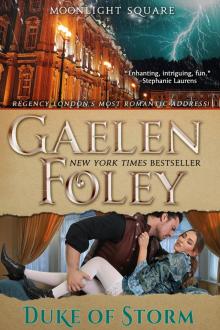 Duke of Storm
Duke of Storm Duke of Scandal (Moonlight Square, Book 1)
Duke of Scandal (Moonlight Square, Book 1) My Irresistible Earl
My Irresistible Earl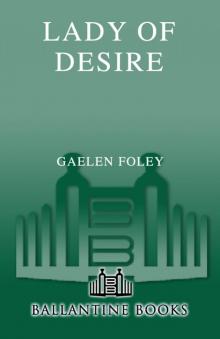 Lady of Desire
Lady of Desire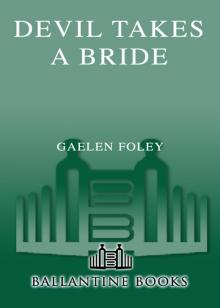 Devil Takes A Bride
Devil Takes A Bride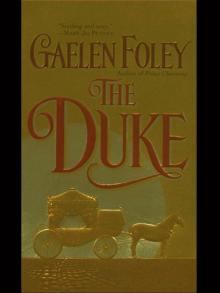 The Duke
The Duke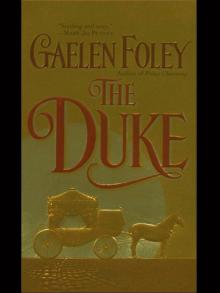 The Duke: The Knight Miscellany Series: Book 1
The Duke: The Knight Miscellany Series: Book 1 Her Secret Fantasy
Her Secret Fantasy Her Only Desire
Her Only Desire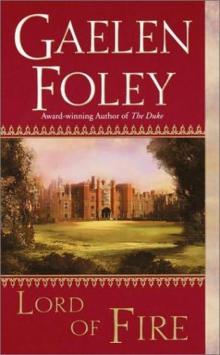 Lord of Fire
Lord of Fire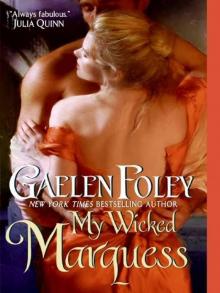 My Wicked Marquess
My Wicked Marquess My Scandalous Viscount
My Scandalous Viscount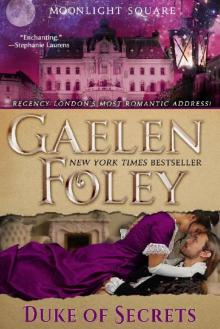 Duke of Secrets (Moonlight Square, Book 2)
Duke of Secrets (Moonlight Square, Book 2)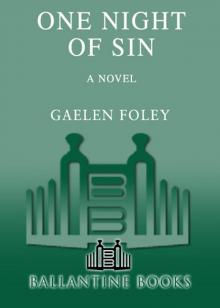 One Night of Sin
One Night of Sin The Secrets of a Scoundrel
The Secrets of a Scoundrel Dream of Me (Harmony Falls, Book 1)
Dream of Me (Harmony Falls, Book 1)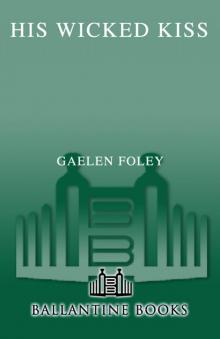 His Wicked Kiss
His Wicked Kiss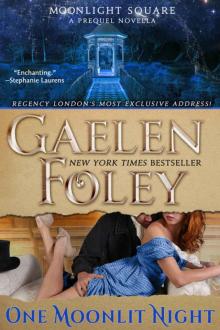 One Moonlit Night (Moonlight Square: A Prequel Novella)
One Moonlit Night (Moonlight Square: A Prequel Novella)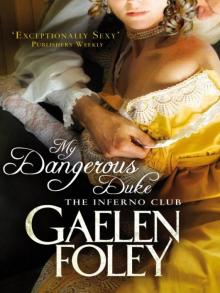 My Dangerous Duke
My Dangerous Duke